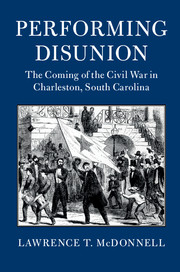Introduction: Politics, Chess, Hats
Published online by Cambridge University Press: 08 June 2018
Summary
One hundred and thirty years later, I encountered the Vigilant Rifles much as Bill Gist did, by reading Sam Tupper's surprising letter. First I found a faded photocopy in the governor's papers at the state archives in Columbia. Then I located the original crammed inside a box of captured military documents at the National Archives. I had been searching for rosters of Minute Men companies in South Carolina, hoping to learn what sort of fellows joined and led these radicals. Did big planters dragoon the small fry into arms? Did young men become Young Turks to prove themselves? Once I turned up my lists, I knew, the answers would appear.
But Sam Tupper's list was confounding. Even before I tried tracing his volunteers, I saw the problem: the Vigilant Rifles were from Charleston. There was no way to answer my questions about planter– yeoman relations using these documents; there were no farms in Charleston. Age or wealth or political leadership might prove important in the decision to become a Minute Man, but that knowledge could shed little light on the organization's character in towns like Columbia, Winnsboro, or Spartanburg, or at crossroads where a church or store focused activity. For what I wanted to know, Tupper's list was useless. Charleston was different from anywhere in South Carolina, different from anywhere in the South.
That obvious fact came as an epiphany to me, since most histories of secession deny it. There was not one secession crisis, I recognized, but at least eleven, overlapping yet distinct: South Carolina quit the Union on December 20, 1860, and nine other states followed on nine different dates before Tennessee lagged out on June 8, 1861. And within each of those conflicts, Southerners contested separation through scores of smaller, semipermeable struggles, linking county cliques and dividing dinner tables. Those few scholars who have offered unitary explanations of the birth of the Confederacy acknowledge differences of timing and circumstance, yet leave the bewildering, all- important “details” of local action for others to explain.
- Type
- Chapter
- Information
- Performing DisunionThe Coming of the Civil War in Charleston, South Carolina, pp. 6 - 20Publisher: Cambridge University PressPrint publication year: 2018



